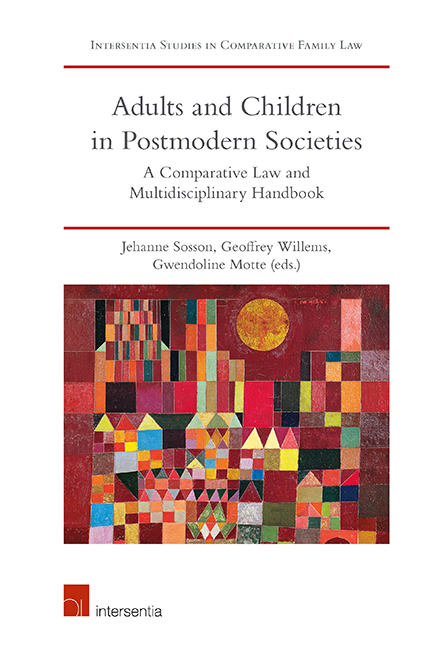Book contents
- Frontmatter
- Contents
- List of Cases
- List of Contributors
- Introduction
- PART I NATIONAL REPORTS ON LEGAL REGULATIONS OF RELATIONSHIPS BETWEEN ADULTS AND CHILDREN
- Questionnaire
- Models
- Algeria
- Argentina
- Australia
- Belgium
- Canada
- Democratic Republic of the Congo
- England and Wales
- France
- Germany
- Ireland
- Italy
- Japan
- The Netherlands
- Romania
- Spain and Catalonia
- Sweden
- Switzerland
- United States of America
- PART II INTERDISCIPLINARY APPROACH
- PART III INTERNATIONAL LAW INSIGHTS
- PART IV COMPARATIVE APPROACH
- General Conclusion: The Challenge of Transparent and Inclusive Parenthood/Parentality in a Pluralist and Cosmopolitan Context
- About the Editors
Romania
from PART I - NATIONAL REPORTS ON LEGAL REGULATIONS OF RELATIONSHIPS BETWEEN ADULTS AND CHILDREN
Published online by Cambridge University Press: 26 June 2019
- Frontmatter
- Contents
- List of Cases
- List of Contributors
- Introduction
- PART I NATIONAL REPORTS ON LEGAL REGULATIONS OF RELATIONSHIPS BETWEEN ADULTS AND CHILDREN
- Questionnaire
- Models
- Algeria
- Argentina
- Australia
- Belgium
- Canada
- Democratic Republic of the Congo
- England and Wales
- France
- Germany
- Ireland
- Italy
- Japan
- The Netherlands
- Romania
- Spain and Catalonia
- Sweden
- Switzerland
- United States of America
- PART II INTERDISCIPLINARY APPROACH
- PART III INTERNATIONAL LAW INSIGHTS
- PART IV COMPARATIVE APPROACH
- General Conclusion: The Challenge of Transparent and Inclusive Parenthood/Parentality in a Pluralist and Cosmopolitan Context
- About the Editors
Summary
In Romania family relations are regulated only by law.
The principal source of civil law, which includes family law, is the Civil Code of Romania (officially Law no. 287/2009 of the Civil Code). The current Civil Code came into effect on 1 October 2011, replacing the old Civil Code of 1864, as well as the Family Code of 1953.
Some aspects of family relations are regulated by special laws, which complete the norms within the Civil Code. Relevant in the context of relationships between adults and children are Law no. 272/2004 on the protection and promotion of the rights of the child, and Law no. 273/2004 concerning the legal status of adoption.
The Romanian legal system does not recognise legal precedent as stare decisis.
CHANGES IN THE TRADITIONAL FAMILY
A. MOTHERS
1. Is maternity automatically established by the birth certificate?
As a general statement, according to Romanian law, in order to produce legal effects, filiation must be proven as prescribed. As a rule, civil status is established by acts produced by the civil service officers and the civil office certificates handed to the parties. Thus, proof of filiation is made through the act of birth of the respective person and the birth certificate produced on the basis of the former. For children born within a marriage, the marriage must be supported by the act of marriage itself, as well as the marriage certificate.
The Romanian civil law system clearly states that maternal filiation is established ex lege, by the act of giving birth and by the birth certificate consequently released (Article 408 of the Civil Code).
The birth certificate attests not only the fact of birth, but also the child's identity, by attesting that a certain woman gave birth to a child at a mentioned date and location and that the birth certificate holder and no other person was born by that woman in that specific place and at that given time.
- Type
- Chapter
- Information
- Adults and Children in Postmodern SocietiesA Comparative Law and Multidisciplinary Handbook, pp. 451 - 480Publisher: IntersentiaPrint publication year: 2019

